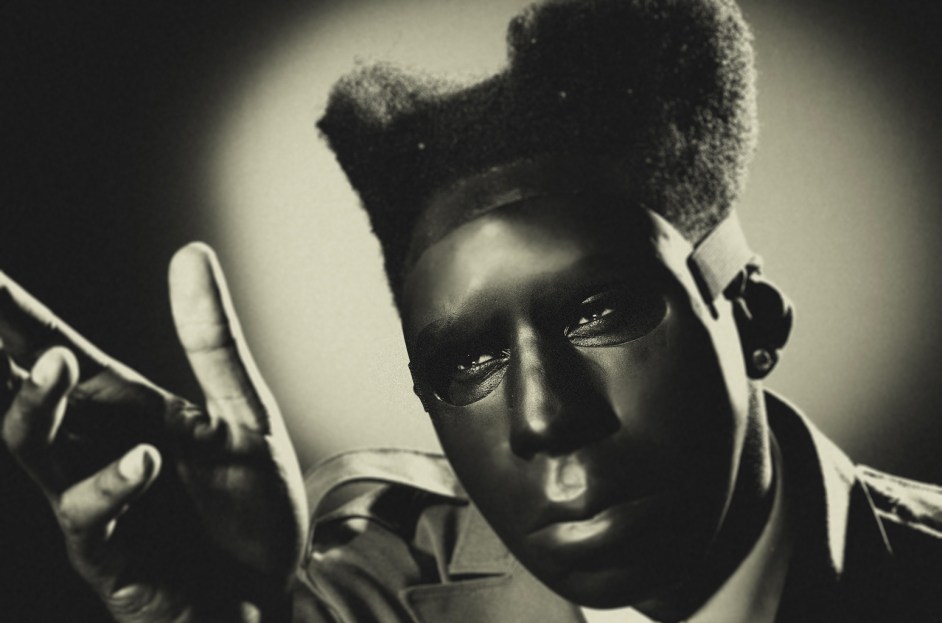USA NEWS – Tyler, the Creator’s surprise release Chromakopia has captivated fans and critics alike, unveiling an album that defies traditional genre boundaries while exploring themes of identity, fame, and self-reflection. Known for his unpredictability, Tyler first announced there would be no new music this year. However, the unexpected arrival of Chromakopia has shown that his art remains as boundary-pushing as ever.
In the weeks before Chromakopia’s release, fans were teased with cryptic videos that resembled snippets of a surreal, military-infused TV show. The scenes appeared dreamlike and disorienting, with Tyler sometimes seen wearing a mask and military uniform, directing a troop of men, or standing atop an aircraft. These visuals, as bizarre as they were intriguing, hinted at a high-concept project, sparking fan theories that he might introduce a new persona, perhaps inspired by The Phantom Tollbooth. Yet, upon listening, Chromakopia reveals a deeply personal side of Tyler, centering on familiar struggles rather than adopting a new character.
Chromakopia dives into existential themes, including relationships, self-worth, and the burdens of fame. Now in his early 30s, Tyler is grappling with life’s larger questions. On tracks like Noid and Rat Tah Tah, he openly questions his place in the industry, from anxieties about his accountants to a lingering mistrust of his fans. It’s here that Tyler’s album begins to uncover the universal fears of aging and responsibility — fears that are rarely broached so candidly in hip-hop.
Much of Chromakopia embodies this duality: brash confidence mixed with moments of crippling self-doubt. Tyler confronts his insecurities about relationships and his career, with lyrics alternating between boastful affirmations and admissions of loneliness. This inner conflict is captured in lyrics like “All I got is photos of my ‘Rari and some silly suits,” reflecting the emptiness that success can bring.
Throughout Chromakopia, Tyler moves effortlessly between introspection and raw confrontation. On Tomorrow, Tyler shifts from proudly proclaiming his free-spirited nature to a somber reflection on his own isolation. Tracks like Judge Judy begin as light-hearted expressions of desire, only to transform into haunting reflections on despair. Like Him is another track that turns introspective, as Tyler contemplates his father’s absence, with a touching voice clip from his mother admitting, “It’s my fault you never met him.”
In Take Your Mask Off, he challenges various characters living in denial, including a wealthy, unhappy housewife and a homophobic figure who is secretly homosexual. But in a typical Tyler twist, he turns the scrutiny inward, questioning his own authenticity with the line, “You talk a lot of sh*t to not even be number one.”
Tyler’s lyricism is marked by constant contradictions. Each track gives the impression that he’s still searching for answers, embodying a state of unresolved tension, which he brings to life through vivid storytelling. Despite his popularity, Chromakopia reveals that Tyler is still wrestling with the expectations of adulthood and the ghosts of his past.
Musically, Chromakopia is equally complex, shifting unpredictably from one soundscape to another. Tyler brings an array of styles and influences into his compositions, blending G-funk synths, Neptunes-inspired beats, acoustic guitar melodies, and 80s R&B slow jams with orchestral elements. Noid is a prime example, featuring distorted guitars that abruptly cut off, creating an unsettling atmosphere complemented by soft, cooing vocals from Willow Smith.
His affinity for eclectic soundscapes doesn’t stop there. Judge Judy opens with playful beats before culminating in darker tones, reflecting the lyrics’ shift from light-hearted humor to brooding contemplation. Tyler’s ability to navigate these disparate sounds is part of what makes Chromakopia such a compelling experience. He combines an array of genres into a cohesive whole, creating a musical journey that is both unpredictable and exhilarating.
One of the album’s recurring motifs is a series of gasps, grunts, and vocal exclamations that lend each track an air of tension. This vocal layering threads through the entire album, making even its quieter moments feel claustrophobic. This sonic layering gives Chromakopia a sense of urgency, as if Tyler is grasping for answers that continually evade him.
Although Chromakopia includes contributions from artists like Lil Wayne and Childish Gambino, their names are notably absent from streaming platforms and promotional materials. This decision reflects Tyler’s commitment to keeping the album’s focus on his own journey. The guest artists add depth without overshadowing Tyler’s introspective storytelling.
Their voices meld into the album’s fabric, offering added layers of texture rather than distracting from Tyler’s personal narrative. Each collaborator subtly enhances the album’s thematic core, creating a unique listening experience that keeps the spotlight firmly on Tyler’s lyrical exploration.
At over an hour long, Chromakopia is an emotionally intense listen. The closing track, I Hope You Find Your Way Home, captures Tyler’s ongoing sense of dislocation, ending the album on an ambiguous note. With lyrics like “I’m slipping, I’m slipping… I need a hand,” Tyler leaves listeners with a sense of unresolved tension, suggesting that his journey is far from over.
The title itself hints at the theme of duality: “Chromakopia” could be interpreted as a fusion of color and chaos, reflecting Tyler’s fragmented emotional state. Each track serves as a glimpse into his inner world, a place where certainty is elusive, and self-identity is fluid.
Early reviews for Chromakopia highlight its complexity, with critics commending Tyler’s willingness to confront the darker aspects of fame and maturity. While some fans find the album’s introspective tone jarring, others appreciate the vulnerability Tyler exhibits. Many have taken to social media to share their interpretations, with some suggesting that Chromakopia captures the essence of an early midlife crisis. This resonance with fans indicates that Tyler’s personal struggles have struck a chord with listeners navigating similar questions.
Chromakopia ultimately stands as a powerful testament to Tyler, the Creator’s evolution as an artist. While he has always pushed creative boundaries, this album marks a shift towards a more introspective and existential approach to his music. By delving into the complexities of identity and self-worth, Tyler has crafted an album that resonates on multiple levels, offering listeners both an emotional and auditory journey.
Through Chromakopia, Tyler confronts his fears and contradictions, painting a vivid portrait of a man on the cusp of significant change. In doing so, he invites listeners to join him on his journey, navigating the uncertainties of life with the same relentless energy and honesty that have defined his career.
As fans and critics continue to analyze Chromakopia, Tyler’s seventh album has left a lasting impression. Its raw honesty, experimental soundscapes, and deeply personal themes make it a standout addition to his discography. Whether grappling with the pressures of fame or questioning his future, Tyler’s journey through Chromakopia is both unsettling and enthralling, offering a glimpse into the artist’s psyche as he navigates the complex terrain of early adulthood.
In a genre often dominated by bravado and posturing, Chromakopia is a refreshing departure, embodying vulnerability and introspection rarely seen in hip-hop. As Tyler, the Creator confronts the next chapter of his life, Chromakopia serves as a fascinating exploration of identity, reminding us that even the most successful artists face the same questions we all do.


